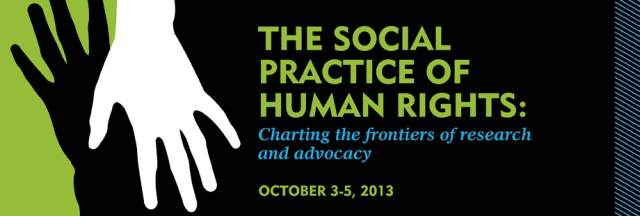Explaining Advocacy Agenda: Human Rights NGOs in Turkey
Location
River Campus, Room M2265
Start Date
10-4-2013 1:00 PM
Abstract
Since the end of Second World War, the idea of human rights, from previously idealist connotations, have gradually reached wide appeal in most of the countries, becoming common moral language in the globe. Civil society has played a fundamental role in advancing and universalizing the idea of human rights as well as in protection of them against the violator actors including states and private corporations (Chandler, 2001). However, there are numbers of issues of concerns and vulnerable populations competing for more attention. Even though civil society actors have made campaigns on some issues and been successfully influential in the international sphere, other issues and population of concerns have been largely ignored in the agenda of human rights advocacy (Keck and Sikkink, 1998; Bob, 2002, 2005, 2007; Carpenter, 2007, 2010, 2011; Carpenter, Duygulu and Tomaskovic-Devey, 2011). In this regard, it is essential to ask why some issues but not others galvanize human rights NGOs and activists.
The basic purpose of this thesis is to trace highly regarded issues and non-issues in Turkey's context and to analyze the dynamics that have influenced behaviors of domestic human rights NGOs in Turkey to select particular issues but not others. Utilizing existing hypotheses in the literature on issue emergence and advocacy agenda-setting, this paper describes and analyzes the impact of the issue-related, the actor-related and the context-related factors on the configuration of advocacy agenda of the local human rights NGOs in Turkey. Furthermore, in this analysis, the relationships between human rights NGOs - donors, the Islamist perspective on human rights and the impact of Europeanization process become scopes of secondary analysis to discover dynamics in terms of their impact on advocacy agenda setting.
Explaining Advocacy Agenda: Human Rights NGOs in Turkey
River Campus, Room M2265
Since the end of Second World War, the idea of human rights, from previously idealist connotations, have gradually reached wide appeal in most of the countries, becoming common moral language in the globe. Civil society has played a fundamental role in advancing and universalizing the idea of human rights as well as in protection of them against the violator actors including states and private corporations (Chandler, 2001). However, there are numbers of issues of concerns and vulnerable populations competing for more attention. Even though civil society actors have made campaigns on some issues and been successfully influential in the international sphere, other issues and population of concerns have been largely ignored in the agenda of human rights advocacy (Keck and Sikkink, 1998; Bob, 2002, 2005, 2007; Carpenter, 2007, 2010, 2011; Carpenter, Duygulu and Tomaskovic-Devey, 2011). In this regard, it is essential to ask why some issues but not others galvanize human rights NGOs and activists.
The basic purpose of this thesis is to trace highly regarded issues and non-issues in Turkey's context and to analyze the dynamics that have influenced behaviors of domestic human rights NGOs in Turkey to select particular issues but not others. Utilizing existing hypotheses in the literature on issue emergence and advocacy agenda-setting, this paper describes and analyzes the impact of the issue-related, the actor-related and the context-related factors on the configuration of advocacy agenda of the local human rights NGOs in Turkey. Furthermore, in this analysis, the relationships between human rights NGOs - donors, the Islamist perspective on human rights and the impact of Europeanization process become scopes of secondary analysis to discover dynamics in terms of their impact on advocacy agenda setting.




Comments
This biennial conference provides a unique space for scholars, practitioners and advocates to engage in collaboration, dialogue and critical analysis of human rights advocacy — locally and globally. Learn more about the Human Rights Center at the University of Dayton >>>.